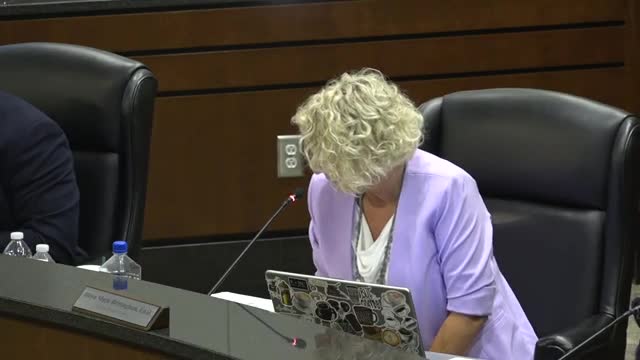School Board Approves Controversial Groundskeeping Contract
July 17, 2024 | SUFFOLK CITY PBLC SCHS, School Districts, Virginia

This article was created by AI summarizing key points discussed. AI makes mistakes, so for full details and context, please refer to the video of the full meeting. Please report any errors so we can fix them. Report an error »

In a recent Suffolk School Board meeting, discussions centered on the adoption of educational materials and the outsourcing of groundskeeping services, highlighting significant operational challenges and strategic decisions.
The board addressed the need for a comprehensive phonics curriculum in light of the Virginia Literacy Act. Concerns were raised about the existing Wonders textbook series, which has been adopted for grades K-5 but lacks essential phonemic instruction for third graders. Chief Academic Officer Dr. Branch explained that while Wonders is a recognized resource, it requires supplementation to meet state standards. The board emphasized the importance of aligning educational materials with legislative requirements to enhance literacy outcomes for students.
Dr. Branch noted that the Virginia Department of Education has approved a list of vendors to support the Literacy Act, and the district is in the process of evaluating additional resources. The board acknowledged the evolving nature of curriculum requirements, particularly as the Literacy Act expands to include middle school grades.
In a separate agenda item, the board voted to approve a resolution for HES Facilities LLC to provide groundskeeping services for Suffolk Public Schools. This decision was driven by the need to alleviate the workload on custodial staff, who have historically managed grass cutting alongside their other duties. The district currently employs eight grass cutters, but the outsourcing arrangement aims to improve efficiency and maintain the appearance of school grounds.
Board member Mr. Riddick expressed concerns about outsourcing, suggesting that local hiring could be a viable alternative. However, district officials clarified that the arrangement with HES is designed to enhance service quality without displacing current employees. Staff will have the option to remain with Suffolk Public Schools or transition to HES, ensuring job security and continuity.
The board's decisions reflect a commitment to improving educational resources and operational efficiency, while also navigating the complexities of state mandates and community expectations. As the district moves forward, it will continue to assess the effectiveness of its curriculum and groundskeeping strategies to better serve students and staff alike.
The board addressed the need for a comprehensive phonics curriculum in light of the Virginia Literacy Act. Concerns were raised about the existing Wonders textbook series, which has been adopted for grades K-5 but lacks essential phonemic instruction for third graders. Chief Academic Officer Dr. Branch explained that while Wonders is a recognized resource, it requires supplementation to meet state standards. The board emphasized the importance of aligning educational materials with legislative requirements to enhance literacy outcomes for students.
Dr. Branch noted that the Virginia Department of Education has approved a list of vendors to support the Literacy Act, and the district is in the process of evaluating additional resources. The board acknowledged the evolving nature of curriculum requirements, particularly as the Literacy Act expands to include middle school grades.
In a separate agenda item, the board voted to approve a resolution for HES Facilities LLC to provide groundskeeping services for Suffolk Public Schools. This decision was driven by the need to alleviate the workload on custodial staff, who have historically managed grass cutting alongside their other duties. The district currently employs eight grass cutters, but the outsourcing arrangement aims to improve efficiency and maintain the appearance of school grounds.
Board member Mr. Riddick expressed concerns about outsourcing, suggesting that local hiring could be a viable alternative. However, district officials clarified that the arrangement with HES is designed to enhance service quality without displacing current employees. Staff will have the option to remain with Suffolk Public Schools or transition to HES, ensuring job security and continuity.
The board's decisions reflect a commitment to improving educational resources and operational efficiency, while also navigating the complexities of state mandates and community expectations. As the district moves forward, it will continue to assess the effectiveness of its curriculum and groundskeeping strategies to better serve students and staff alike.
View full meeting
This article is based on a recent meeting—watch the full video and explore the complete transcript for deeper insights into the discussion.
View full meeting
